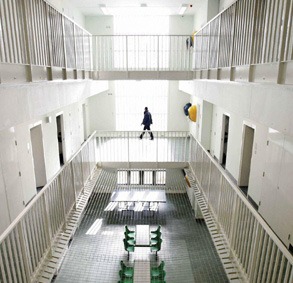Why is it that we go on tolerating UK arms exports to countries that abuse human rights? For a brief moment it seemed as if Robin Cook's 'ethical dimension to foreign policy' might signal some reflection on our role as the world's second largest arms exporter, after the US, or at least prompt some greater thought about the nature of the regimes we were so busily and profitably arming. But those hopes have been disappointed.
A BAE Hawk Jet A promising start – a ban on landmines, an Annual Report on arms exports, and the establishment of a European Code of Conduct – has not been sustained. Over recent years the Government has licensed a string of highly questionable arms deals. These include military components for Israel, despite their attacks on Palestinians in the occupied territories; a costly and inappropriate air traffic control system for Tanzania, one of the poorest countries in the world; and spare parts for Hawk jets for Zimbabwe, although Mugabe jails and tortures his opponents.
Post September 11, there has also been a greater willingness to supply arms to countries seen as on side in George Bush's 'war on terror', regardless of their record on human rights. This includes countries like Bahrain, Jordan, Kuwait, Oman, Nepal, Pakistan, Qatar, Saudi Arabia and the United Arab Emirates. The record of Saudi Arabia is particularly gruesome. The 2002 Amnesty International Report talks of "grave and widespread human rights violations", the "flogging of teenagers", "systematic discrimination against women" and "79 executions".
While the 'ethical dimension' was supposed to signal a new departure in foreign policy, the Ministerial justification for exports to these countries has a familiar ring. Arms exports, they claim, are good for the UK economy and good for jobs. By implication therefore, ethics can only be considered when they are affordable.
This is wrong in principle – if something is the right thing to do, we should be prepared to do it even if there are costs associated with doing so. But it also represents a seriously outdated view of the economics of the arms trade.
November 2001 saw the publication of a major report on the subject – 'The Economic Costs and Benefits of UK Defence Exports'. This report was commissioned by the Ministry of Defence (MoD), authored by two senior MoD economists and two independent academics, and the report was published by the York University Centre for Defence Studies.
The 'York Report' estimated the economic effect of a 50 per cent reduction in arms exports (the 50 per cent figure was chosen purely as a basis for economic calculation, not because any of the authors were necessarily advocating a reduction in defence exports of that scale). They concluded that this reduction would result in a loss of 49,000 jobs in the defence sector. But they find that this would be offset by the creation over a five-year period of around 67,000 new jobs in non-defence employment, with most of these jobs created in the first two years. Why? Because in a market economy, resources, including human resources, are constantly reallocated between different uses. Former defence workers will be re-employed elsewhere.
Despite the claims that are often made for the significance of arms exports in national prosperity, the authors asserted that, "At the end of the five year period, overall national income would be substantially the same as it would otherwise have been without the loss of defence exports." Critically, the report concluded, "the economic costs of reducing defence exports are relatively small and one-off" and "the balance of argument about defence exports should depend mainly on non-economic considerations."
This report, further elaborated in the most recent issue of the Institute for Fiscal Studies, comprehensively turns the tables on the defence exports lobby. It means that ethics can come back in from the cold. It makes it possible again to consider the human impact of arms exports on people living in war-torn societies abroad.
While arms are not the cause of these wars, they frequently fuel, exacerbate and prolong them, increasing the levels of human suffering for those caught up in conflict situations. In the 1990s an estimated 3.6 million people died in armed conflicts in developing countries, the majority of them civilians.
Wars, fuelled by the ready availability of arms, can create massive population displacement. There are now 40 million displaced people across the world, and the UN High Commissioner for Refugees has said, "armed conflict is now the driving force behind most refugee flows."
Armed conflicts also do enormous damage to development in the poorest countries, by destroying infrastructure, and deterring economic activity and domestic and inward investment.
But there are wider implications. Irresponsible arms transfers can also contribute to regional and global instability. They can create a 'boomerang' effect, or what American analysts call 'blowback'- policies that rebound negatively and unpredictably on those who prosecute them.
This includes arming potential enemies, with exported weapons then used against our own forces; and the risk of diversion, with arms exports ending up in the hands of rogue states or terrorists. The last Tory Government armed Saddam Hussein's Iraq in the 1980s; in the same decade the US poured vast quantities of weaponry into the Mujahideen in Afghanistan to aid their struggle against Soviet occupation. Much of this equipment ended up with the Taliban.
What does this mean for UK policy and where it should go next? The Government should usefully start by implementing its own declared policy on arms exports, the inelegantly named Consolidated EU and National Arms Export Licensing Criteria. These state that arms should not be licensed for export where they would impact negatively on human rights, regional stability or conflict, or the sustainable development of poorer countries.
In the last parliamentary session, the Government passed an Export Control Act – a belated response to the the 1996 'Scott Report' into arms to Iraq) – that was supposed to overhaul the UK's arms export controls.
While there are some positive aspects to the Act, it has also been a missed opportunity. The Government should use the secondary legislation arising from the Act to improve controls. Three changes in particular would make a big difference.
The Government should tighten controls over arms brokers. These are third party intermediaries who arrange for arms to be transferred from, say, Eastern Europe to Africa, without ever passing through the UK. For example, much of the weaponry in use in today's conflict zones in Africa is transferred there by brokers. The new Export Control Act provides the Government with a general power to control UK arms brokers, but it backs away from the Government's manifesto commitment to introduce legal powers to act against UK nationals who leave the country to broker their deal. This is an important loophole in the legislation that should be closed.
The Government also needs to change the way in which arms export decisions are taken. It is well known, for example, that Government Ministers, including the Prime Minister, have been lobbying to sell 60 Hawk jets to India. This surely makes a mockery of the export licensing process. How can Ministers make an objective assessment of the licence for this deal when they have been so actively involved in promoting it? There should be clear limits on ministerial involvement in arms export promotion. And the Government should scrap the Defence Exports Sales Organisation (DESO) – a body set up by Denis Healey when he was Labour Defence Minister in the 1960s, with the remit of promoting arms sales to the developing world.
There also needs to be greater parliamentary involvement on arms issues. Four select committees, covering the areas of international development, trade and industry, foreign affairs and defence, have called for the establishment of a prior parliamentary scrutiny committee. This would consist of experienced parliamentarians who would be allowed to consider a select number of arms export licences to sensitive destinations on a confidential basis. While Ministers would not cede any decision-making powers to the Committee, it could play a vital role in improving the quality of the decisions taken and help to restore some integrity to the licensing process.
For too long, the moral and self-interested case against arms exports has been trumped by the apparently invincible economic case. That case has now been severely challenged by the Ministry of Defence's own economists. Their findings suggest that a more responsible approach to arms exports is not a question of economic loss versus moral gain. The UK Labour Government, elected on a pledge to tighten up the arms trade, has now no excuse for not doing so.

